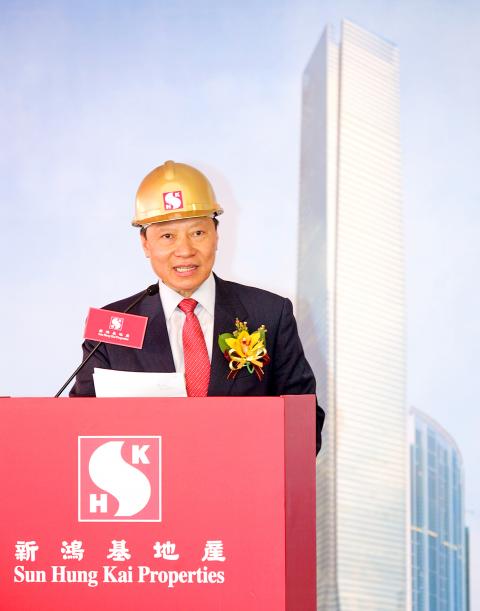Walter Kwok (郭炳湘), the former chairman of Hong Kong real-estate developer Sun Hung Kai Properties Ltd (新鴻基地產), died on Saturday morning at the age of 68, his family said in a statement.
“We are saddened to announce the passing of Mr Walter Kwok, who left this world peacefully on the morning of October 20, with his loving family by his bedside,” the statement said, adding that church service arrangements would be announced in due course.
It did not disclose details of his death.

Photo: Bloomberg
Kwok had a heart attack on Aug. 27 and had been transferred to Hong Kong’s Adventist Hospital, local media reported.
He was the oldest of three sons who inherited the fortune of Kwok Tak-seng (郭德勝), a grocery wholesaler from China’s Guangdong Province who immigrated to Hong Kong after World War II.
Kwok Tak-seng in 1963 joined Fung King-hey (馮景禧) and Lee Shau-kee (李兆基) to found Sun Hung Kai Properties. The company’s business has stretched into other areas, including logistics and telecommunications.
The three sons — Walter Kwok, Thomas Kwok (郭炳江) and Raymond Kwok (郭炳聯) — took over the company after their father died from a heart attack in 1990. Walter, also known by his Chinese name Ping-sheung, ran the company until 2008, after a public family squabble.
Walter Kwok said that Thomas and Raymond had him removed from his position because they thought he was suffering from a mental illness, which he denied.
Hong Kong’s Standard newspaper reported that Walter Kwok was forced to go on leave after a disagreement with his brothers over a female friend’s growing influence in the company.
He later sued his siblings for libel, but they settled their dispute amicably in January 2014.
In 2010, Walter began pursuing his own property projects with his company Empire Group Holdings (帝國集團).
Empire this year was awarded a redevelopment project in the tourist area of Tsim Sha Tsui, on which it planned to spend HK$6 billion (US$765 million), the South China Morning Post reported.

MARKET LEADERSHIP: Investors are flocking to Nvidia, drawn by the company’s long-term fundamntals, dominant position in the AI sector, and pricing and margin power Two years after Nvidia Corp made history by becoming the first chipmaker to achieve a US$1 trillion market capitalization, an even more remarkable milestone is within its grasp: becoming the first company to reach US$4 trillion. After the emergence of China’s DeepSeek (深度求索) sent the stock plunging earlier this year and stoked concerns that outlays on artificial intelligence (AI) infrastructure were set to slow, Nvidia shares have rallied back to a record. The company’s biggest customers remain full steam ahead on spending, much of which is flowing to its computing systems. Microsoft Corp, Meta Platforms Inc, Amazon.com Inc and Alphabet Inc are

Luxury fashion powerhouse Prada SpA has acknowledged the ancient Indian roots of its new sandal design after the debut of the open-toe footwear sparked a furor among Indian artisans and politicians thousands of miles from the catwalk in Italy. Images from Prada’s fashion show in Milan last weekend showed models wearing leather sandals with a braided design that resembled handmade Kolhapuri slippers with designs dating back to the 12th century. A wave of criticism in the media and from lawmakers followed over the Italian brand’s lack of public acknowledgement of the Indian sandal design, which is named after a city in the

The US overtaking China as Taiwan’s top export destination could boost industrial development and wage growth, given the US is a high-income economy, an economist said yesterday. However, Taiwan still needs to diversify its export markets due to the unpredictability of US President Donald Trump’s administration, said Chiou Jiunn-rong (邱俊榮), an economics professor at National Central University. Taiwan’s exports soared to a record US$51.74 billion last month, driven by strong demand for artificial intelligence (AI) products and continued orders, with information and communication technology (ICT) and audio/video products leading all sectors. The US reclaimed its position as Taiwan’s top export market, accounting for

INVESTOR RESILIENCE? An analyst said that despite near-term pressures, foreign investors tend to view NT dollar strength as a positive signal for valuation multiples Morgan Stanley has flagged a potential 10 percent revenue decline for Taiwan’s tech hardware sector this year, as a sharp appreciation of the New Taiwan dollar begins to dent the earnings power of major exporters. In what appears to be the first such warning from a major foreign brokerage, the US investment bank said the currency’s strength — fueled by foreign capital inflows and expectations of US interest rate cuts — is compressing profit margins for manufacturers with heavy exposure to US dollar-denominated revenues. The local currency has surged about 10 percent against the greenback over the past quarter and yesterday breached